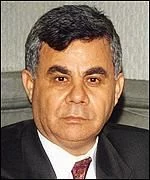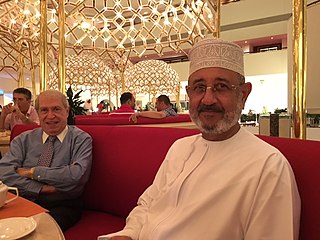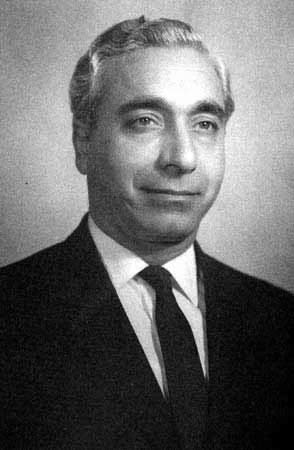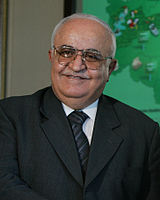
Muhammad Naji al-Otari is a Syrian politician who was Prime Minister of Syria from 2003 to 2011.

Muhammad Mustafa Mero was a Syrian politician who served as Prime Minister of Syria from 7 March 2000 to 10 September 2003.

Muhsen Bilal is a Syrian surgeon, ambassador and Ba'athist politician.

Mahmoud al-Abrash or Mahmoud el-Abrache is a Syrian politician.

The second Mustafa Mero government was the first Syrian government during the presidency of Bashar al-Assad. It was established on 13 December 2001 and lasted until 10 September 2003 when the President designated Muhammad Naji al-Otari to form a new government.
Adel Safar is a Syrian politician and academic, who served as Prime Minister of Syria from 14 April 2011 to 23 June 2012. His government was dissolved by Bashar al-Assad as a result of the Syrian parliamentary election in 2012. He was Minister of Agriculture and Agrarian Reform from 2003 to 2011.
The following lists events that happened during 2011 in Syria.

Syria–Yemen relations refer to the relationship between Yemen and Syria. Yemen has an embassy in Damascus; while Syria has an embassy in Sanaa. Both are members of the Arab League. Both countries generally enjoy good relations and currently have ongoing civil wars, the Syrian Civil War and the Yemeni Civil War.

The Ministry of Information is a government ministry office in Syria responsible for media, press and informations. It is part of the Council of Ministers of Syria.

Ghassan Al Rıfai is a Syrian economist who worked at the World Bank and served as Syria's minister of economy and trade from December 2001 to October 2004.
Mohammad al-Hussein is a Syrian economist and politician who is a member of the Ba'ath Party. He served in different cabinet positions.
Said Mohammad Sammour is a Syrian military officer and politician who served as interior minister between 2009 and 2011.
Muhammad al-Ghafri is a Syrian judge who served as justice minister from 2004 to 2009.
Al-Zoubi, El-Zoubi, Zoubi, or Al-Zubi, is a prominent Levantine family whose members can be found throughout the Arab world, but are most concentrated in Northern Jordan and Southern Syria. The family is a Hasanite, Hashemite family that traces its lineage to the Hanbali Sunni Saint Abdul Qadir Al Gilani.

The Adel Safar government was the third Syrian government formed during the presidency of Bashar al-Assad. On 2 April 2011, President Bashar al-Assad issued Decree No. 134 designating Adel Safar to form a new Government. On 14 April 2011, the new Government was announced through Decree No. 136.

The first government of Hussein Arnous was formed on 30 August 2020 and took the oath of office on 2 September 2020. A new Council of Ministers was formed by Hussein Arnous at the appointment of President Bashar al-Assad. This government was the 94th since Syria gained independence from the Ottoman Empire in 1918 and was the seventh during the presidency of President Bashar al-Assad.

The second government of Hussein Arnous was formed after appointment by the President of Syria on 10 August 2021 and took the oath of office on 14 August 2021, after the presidential election held in May. This replaced the caretaker ministry formed in July. The government was the 95th since Syria gained independence from the Ottoman Empire in 1918 and it was the eighth during the presidency of Bashar al-Assad.

The Hafez al-Assad Government ruled Syria from 1970 to 1971. The Cabinet of Syria was led by then-Prime Minister Hafez al-Assad. This government was the 76th since Syria gained independence from the Ottoman Empire in 1918 and was the first during presidency of Ahmad al-Khatib.

The Second Amin al-Hafiz Government ruled Syria from October 1964 to September 1965. The Cabinet of Syria led by then-Prime Minister Amin al-Hafiz. This government was the 65th since Syria gained independence from the Ottoman Empire in 1918. It was formed on 4 October 1964 by Decree No. 905 and dissolved on 22 September 1965 by Decree No. 2127.

The government of Mohammad Ghazi al-Jalali was formed after appointment by the president of Syria on 23 September 2024 and new Council of Ministers took the oath of office on 24 September 2024, after the 2024 Syrian parliamentary election held on 15 July 2024. This replaced the caretaker ministry formed in July. The government was the 96th since Syria gained independence from the Ottoman Empire in 1918 and was the ninth and last during the presidency of Bashar al-Assad, as well as the last government of Ba'athist Syria.












